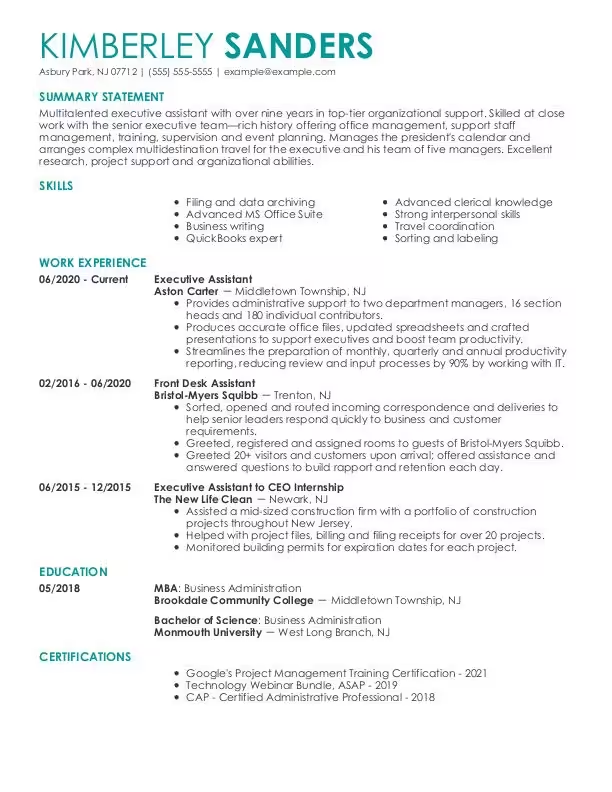Table of contents
As an administrative assistant, you’re great at tasks like answering phones, arranging meetings, and managing office tasks. But creating your resume might seem difficult.
That’s okay! Even the most organized administrative assistant needs a helping hand of their own. The good news is you can make a top-shelf administrative assistant resume in minutes even if you’re learning how to write a resume for the first time.
All you have to do is follow our step-by-step guide to create an administrative assistant resume that’ll draw the attention of major employers.
This guide will show you:
- Administrative assistant resume examples for different levels of experience.
- What makes a great administrative assistant resume example.
- Proven strategies for writing a job-winning resume.
- What to include in each section of your resume.
- How to select the ideal resume format and design for the position.
OK, let’s review a couple of resume examples for job seekers at different stages in their careers as administrative assistants.
Administrative assistant resume examples
What makes this a great administrative assistant resume sample
-
Skills take center stage
With multiple skill sections featured prominently, this applicant effectively showcases their capabilities even without much work experience.
-
The objective statement lays out clear goals
For those starting out in the field, a well-written resume objective can set the tone for the rest of the resume and show ambition.
-
Features a balance of hard and soft skills
By offering a blend of technical and interpersonal abilities, such as collaboration and problem-solving, this candidate shows they are the all-in-one package.
What makes this a great administrative assistant resume sample
-
Work history is emphasized
This candidate understands that a track record of success is the key to impressing potential employers, so they put their work history in the spotlight.
-
Metrics are used effectively
Rather than simply listing responsibilities, this resume focuses on measurable results — exactly what employers want to see.
-
Relevant certifications are featured
By including their professional certifications, this candidate shows they are dedicated to staying current in their field and constantly improving their skills.
Looking for a specific job title? Check out more resume examples related to your career field:
Choose a format for your administrative assistant resume
Resume formats organize your resume sections differently on the page. Each format is set up to help job seekers represent their unique qualifications effectively.
There are three different resume formats successful job seekers use:
- Chronological: Emphasizes work history, starting with the most recent job.
- Functional: Details your skills as the centerpiece of the resume while minimizing work experience.
- Combination: Offers a healthy balance between professional experience and skills.
If you have consistent work experience, the chronological format is the gold standard. Job seekers with little to no experience may want to utilize a functional resume. And, those with some experience — three to five years, let’s say — may find a combination resume helps the most.
Once you’ve picked a format, turn to our resume-formatting guide for tips on font size, spacing, margins and more.
The next order of business? Styling your resume.
How to pick a resume template
Templates are resume designs. All resumes have the same key parts, like your personal information at the top and your education history at the bottom. However, the way these sections are arranged can vary a lot depending on the style of the resume.
If you’re an administrative assistant, it’s a good idea to pick a resume style that fits well with your industry.
For example, if you work in the arts and entertainment business, a creative or modern template might deliver exactly what you need. On the other hand, if you work in law or finance, a simple template may be your best choice.
Now, let’s go through your resume step by step, with writing advice for each section.
How to write an administrative assistant resume in 5 simple steps
You can write an administrative assistant resume in just five steps. Let’s go section by section. By the end, you’ll have a resume that’s professional, concise and easy to scan.
Step 1
Study the administrative assistant job description
Start with the job listing. Review the post line by line, highlighting all the skills and qualifications. The words you highlight are the keywords you should include on your resume. Including these words is crucial because some employers use an applicant tracking system (ATS) to filter out resumes missing critical keywords. You should always have your eyes set on getting past the ATS.
Step 2
Write a professional summary or resume objective
The next order of business is writing a professional summary or objective statement to place near the top of your resume.
A professional summary is an overview of your top skills and accomplishments throughout your career, making them the preferred resume profile for experienced job seekers.
Resume objectives, on the other hand, focus on the job seekers’ goals, explicitly relating your transferable skills to the organization’s mission. These are popular with job seekers who recently graduated or simply don’t have as much experience in the industry as others.
Let’s check out how each of these would look on an administrative assistant resume.
Administrative assistant professional summary example:
Passionate and detail-oriented administrative assistant with over 15 years of experience providing comprehensive support to executives and teams in the entertainment industry. Skilled in managing multiple initiatives simultaneously and prioritizing tasks to meet deadlines. Strong interpersonal skills, with a track record of building relationships with internal and external stakeholders. Knowledgeable in Microsoft Office Suite, QuickBooks and various office equipment.
Administrative assistant resume objective example:
Motivated and highly organized recent graduate with a degree in Communication seeking an entry-level administrative assistant position. Demonstrated problem-solving abilities and a track record of delivering results for the university’s Office of Student Life & Athletics. Talented at writing for and communicating verbally with a variety of audiences. Eager to contribute passion for delivering results and acquiring new skills to your fast-paced organization.
Step 3
Highlight your most relevant administrative assistant skills
When you’re done writing your opening statement, focus on the administrative assistant skills you should add to your resume.
Skills are one of the first things a potential employer will look for — and administrative assistants have many of them. You need exceptional soft skills, like communication and collaboration, to work closely with people every day. You also need several technical skills to make sure the meetings get scheduled and tasks get completed in a timely manner.
Here’s a table to help you understand the difference between hard and soft skills.
Hard and soft skills for an administrative assistant resume
- Microsoft Office Suite
- Google Suite
- Data entry
- Bookkeeping
- Project management
- Research
- Communication
- Collaboration
- Organization skills
- Attention to detail
- Problem-solving
- Customer service
Here is an example of a strong administrative assistant skills section:
- Highly effective time management and organization skills, including the ability to manage calendars and multitask.
- Skilled in Microsoft Office Suite, Google Suite and other office productivity software.
- Basic knowledge of accounting software programs like QuickBooks and FreshBooks.
Step 4
Write a strong administrative assistant work experience section
If you have experience, your work history section will be the core of your resume. This section offers an opportunity to present your career highlights in an easily-digestible list. Since recruiters only spend seven seconds glancing at a resume before making a decision, it’s important your resume is scannable.
Here’s an example of a great work history entry:
Administrative Assistant, ABC Business
Nashville, TN
November 2020 – Present
- Managed calendars for five company directors, coordinating more than 50 meetings and appointments each week, and resolving scheduling conflicts within an hour.
- Designed and implemented a new filing system to improve the organization and accessibility of documents, increasing productivity by 10% across the team.
- Simplified the department’s travel booking process, leading to a 30% decline in time spent on booking and a 15% reduction in travel expenses.
- Assisted in planning several company events per year using QuickBooks to ensure we stayed within budget and met all expectations.
- Maintained a 99% accuracy rate in digital recordkeeping, guaranteeing that documentation is accessible.
Give your work experience bullet points more power by using action words. Words like “forged,” “created” and “undertook” give the reader a feeling of confidence and momentum.
Step 5
Showcase your education and training
Credentials are more than a piece of paper — they show you’ve put in time and effort to expand your knowledge and skills. Use the education section of your resume to emphasize these qualifications.
While it’s possible to become an administrative assistant directly out of high school, many employers prefer to hire someone with a college degree. If your degree is in a relevant field, like business administration or communication, that’s a plus!
How to list your administrative assistant education:
Education
Bachelor of Science in Business Administration
Ohio University
Athens, OH
Graduated: May 2021
Relevant Coursework:
- Business Law and Ethics
- Operations Management
- Financial Accounting
Certifications:
- Certified Administrative Professional (CAP)
- Professional Administrative Certification of Excellence (PACE)
For extra oomph, you can add professional certifications and special training to your education section. Or, if the credentials are significant, give them their own section so they can stand alone.
Optional sections for your mechanical engineer resume
Awards and Certifications
Want to take your resume to the next level? Add awards and certifications.
Awards show that you’ve been recognized for your exceptional abilities in an area relevant to the job. For example, an administrative assistant would want to list an award for typing speed.
Certifications are just as important. You can earn a certificate by taking online or in-person classes. Earning one tells the employer that you take your career seriously.
How to list certifications on your administrative assistant resume:
Microsoft Office Specialist (MOS) certification: earned for completing comprehensive training on Microsoft Office Suites, including Word, Excel and PowerPoint.
Certified Administrative Professional (CAP): earned for demonstrating standout administrative skills and a commitment to continual learning.
Projects
Adding projects to your resume shows how your skills are useful beyond the workplace. After all, companies want to hire people who are ambitious, multitalented and have leadership potential — all of which can be demonstrated with a project.
Projects can range from side projects with work colleagues to freelancing or passionate projects that showcase a specific skill set. Any project you completed within the last five or six years that can be tied back to your core qualifications is worth including on your resume.
How to list projects on your administrative assistant resume:
Projects
- Played a leading role in organizing a company-wide office renovation contest, leading to a more modern and functional office environment and lifting employee morale.
- Helped plan and execute a company’s appearance at a national trade show, resulting in a 20% increase in sales leads.
- Implemented a new digital filing system for the local college radio station, giving DJs quicker and easier access to the music files.
Languages
Adding languages to your resume could instantly expand your opportunities, especially in fields where you have a lot of one-on-one interactions with others, like sales and customer service. Mastering extra languages also gives you access to a wider range of experiences, which may be useful in the workplace in unexpected situations.
Ultimately, knowing other languages shows hiring managers you are mentally agile, as well as having greater cultural competency — an important quality in a globalized job market.
How to list languages on your administrative assistant resume:
- Fluent in English and French
- Proficient in Romanian
Interests and Hobbies
Hobbies is a resume section that often gets a bad rap for being an unnecessary distraction. The reality is employers want to hire a full person, not a robot. Sharing a little bit about yourself will make you seem more well-rounded.
The trick is focusing on hobbies and interests that can, in some way, be related back to your work. In the example below, for instance, you’ll see the candidate says they stay up to date on the latest tech products and trends. Administrative assistants regularly use the latest software in their day-to-day jobs and would benefit from reading tech news in their free time.
How to list interests and hobbies on your administrative assistant resume:
- Devotes time to helping local education organizations with their scheduling needs.
- Stays up to date on new consumer technology products and trends.
- Regularly practices yoga and maintains physical and mental wellness.
resumes made with Resume Now!
Include a cover letter
Do you know what you should do when you finish your resume? Write a cover letter.
Cover letters give you space to convince a company you’re the best candidate for the job. You can also use the opportunity to answer questions about your work experience. For example, if you’re returning to the industry after a long break, you can share some context about your absence.
You also want your cover letter to look professional. Start by reviewing cover letter examples and learning the basics about spacing, font and more in our formatting guide.
If you’re afraid of the blank page, don’t worry. We’ve all been there. Using our Cover Letter Generator shortcuts the process by providing auto-generated text based on your work history. Customize the text to your liking before downloading a PDF version to submit with your resume.
Let’s touch on top takeaways before we wrap up.
Key takeaways for your administrative assistant resume
-
Make your resume ATS-friendly
Bypass the bots employers use to screen out resumes by including the right keywords. (Remember: you’ll find them in the job ad.)
-
Organize your sections effectively
If you have extensive experience, a chronological format may be best. With less experience, consider a functional or combination format.
-
Select a suitable design
The style of your resume should align with the position you’re applying for. Make sure your template presents you in the best possible light.
-
Show off a range of skills
Administrative assistants use a range of technical and interpersonal skills, so your resume should strike a balance between the two.
-
Personalize your application
Your resume should be all killer, no filler. That’s why the most successful candidates take time to tailor their resumes to the role.
-
Highlight your impact
Use action verbs, data and metrics in your work experience section to demonstrate the impact you’ve had in previous roles.
-
Go above and beyond
A well-written administrative assistant cover letter can improve your chances of landing the interview — so why not include one?
FAQs from job seekers
Last Updated: January 01, 2025
How do I list references on a resume?
How important is font size on a resume?
What are the differences between hard skills and soft skills?
How do I list technical skills on my resume?
Was this information about Administrative Assistant Resume: Examples, Templates + Tips For 2025 helpful? Let us know!
Don is a Certified Professional Resume Writer (CPRW) with more than 10 years’ experience creating digital content, including four years helping job seekers develop their careers. He holds an M.S. in Journalism from Northwestern University.
More resources

How to Start a Cover Letter (With Examples & Tips)
Your cover letter introduction is your first chance to grab a ...

12 Best Jobs for Moms and Dads That Don’t Require a College Degree
Check out our list of no-degree jobs that offer flexibility an...

20 Surprising High-paying Jobs You Can Do from Home
Looking for a job that you can do from home? Our guide to high...

Network Engineer Resume: Examples, Templates & Tips
Are you skilled with networking technology? Use our network en...

Sales Planner Resume: Examples, Templates & Tips for 2025
Whether you re an experienced professional or just starting ...

Business Process Analyst Resume: Examples, Templates & Tips for 2025
Looking for a job as a business process analyst? Find the perf...



